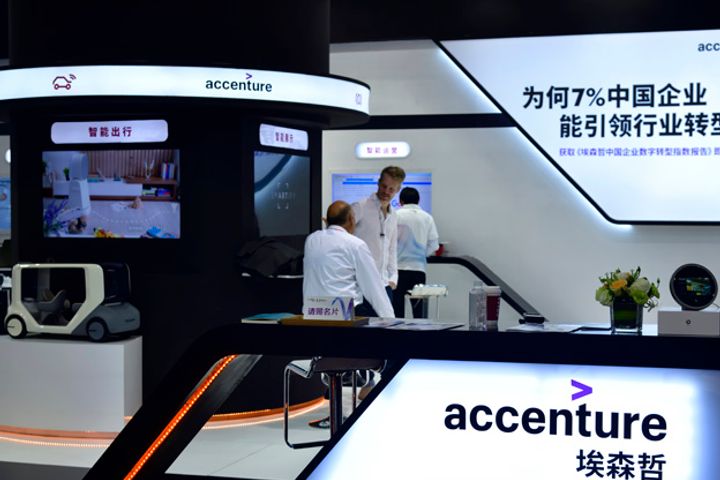 China Must Do More to Lure In Top-Tier AI Talent, Accenture Exec Says
China Must Do More to Lure In Top-Tier AI Talent, Accenture Exec Says(Yicai Global) March 7 -- China, which has vowed to become the world leader in artificial intelligence by 2030, needs to work harder to attract the highest-level talent in the sector, according to a senior executive at global consultancy Accenture.
"The problem with China is not so much that it doesn't attract a lot of talent," Accenture Labs senior managing director Marc Carrel-Billiard told Yicai Global in Shanghai last week. "The problem is that it doesn't attract the top-tier talent. The top-tier talent are still in the US."
China has about 18,000 AI researchers, or around 9 percent of the global total, according to the "China AI Development Report 2018" issued by Tsinghua University last July-- but just 977 of those are among the cream of the crop, even though China collects about 60 percent of global AI investment worldwide.
The nation is doing well in terms of investment and bringing in raw talent, but needs to make more effort if it wants to lure industry greats to Asia, added Carrel-Billiard, who was visiting Accenture's Shanghai offices to promote a new research lab the firm is opening in Shenzhen, China's Silicon Valley.
AI Workers
One of the key things policymakers can do to foster talent is prepare the incoming generation of workers for AI, according to another Accenture report on how the technology can drive China's growth. While technological education currently focuses on people learning how to use machines, in future machines will begin to learn from humans and vice versa.
Advice for business leaders included building a solid talent base that revolves around "creating a culture of inclusion and diversity," the report added. "Concerns over job security, wages and privacy can affect the attitudes of employees and how they embrace and harness AI in their work. [Business leaders'] key will be to integrate AI into the corporate culture."
Carrel-Billiard believes AI is one of four critical technologies that will make up the post-digital future, collectively labeled by Accenture as DARQ -- distributed ledgers, AI, extended reality and quantum computing.
"I think China is doing amazingly well [at using DARQ technologies]," he said. "They're definitely a leader in their domain. Alibaba was one of the first to start piloting what we call quantum encryption for communication. This is really big, there are very limited companies that have been doing that so far."
It is not just the big name companies making advances, either. "We've been meeting a couple of very, very strong artificial intelligence startups [in China] and have been pretty flabbergasted by their leverage of artificial intelligence," he added. "Not just in retail but also in industry. Industry 4.0, Industry X.0 -- there's a lot of progress being made here."
The DARQ Side
While these technologies may well be defining the future world we live in, there are still security concerns that need addressing before they can hit the mainstream.
"This is huge," Carrel-Billiard said. "Maybe we need to reinvent the internet. You saw the immediate effect with the Facebook issue. The platform has been struggling and it's not the only one, a lot of security breaches happened last year."
Facebook has become the poster child for digital security woes after multiple incidents concerning data protection, including a recent breach that it admitted exposed over 50 million users' personal data and the scandal surrounding Cambridge Analytica, which claimed to have amassed over 5,000 data points on 220 million Americans after harvesting data from Facebook profiles without user consent.
Cybersecurity will be one of the major research domains at the new Shenzhen lab, added Carrel-Billiard, who said Accenture already has two facilities honing in on digital protection: one in Herzliya, Israel, and another in Washington DC.
The issue is not only in software security, which has previously been a point of focus, he continued. "We really believe that it's [Internet of Things] security, industrial security, because products are starting to be much more connected with each other. I'm not talking about retail products like Alexa, I'm talking about turbines and all the AI you're going to bring into Industry X.0, into the hospitals, ATMs, everywhere. That needs to be looked at with an holistic view."
Toeing the Line
Another key point for China will be recognizing differences in cultural acceptance of pervasiveness -- a large part of DARQ and its use in the 'momentary marketing,' or on-the-spot advertising based where a user is, what they are doing and when.
China's best-known messaging and lifestyle app, WeChat, "is extremely pervasive," Carrel-Billiard said, adding that he has his own account on the platform. China will need to learn exactly how Europe and the US work and adapt their technologies for these consumers -- and vice versa, he continued.
"American companies are coming here to understand what it's like to live in China and to leverage the platforms they have," he added, touting the vast scalability of the Chinese market, where companies can be among the world's largest in their industry without ever stepping foot outside their home country.